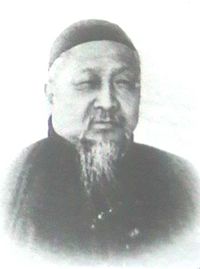Cen Chunxuan: Difference between revisions
Dadapotato (talk | contribs) No edit summary |
Dadapotato (talk | contribs) No edit summary |
||
| Line 11: | Line 11: | ||
| predecessor = [[Tao Mo]] |
| predecessor = [[Tao Mo]] |
||
| successor = [[Zhou Fu]] |
| successor = [[Zhou Fu]] |
||
| office2 = [[President of the Republic of China]] (Rival Government) |
|||
| term2 = [[1913-1928]] |
|||
| birth_date = 1861 |
| birth_date = 1861 |
||
| birth_place = [[Xilin County|Xilin]], [[Guangxi]] |
| birth_place = [[Xilin County|Xilin]], [[Guangxi]] |
||
| Line 17: | Line 19: | ||
| occupation = [[Politician]] |
| occupation = [[Politician]] |
||
| spouse = |
| spouse = |
||
| |
| part = [[Kuomintang]]}} |
||
{{Chinese name|[[Cen (surname)|Cen]]}} |
{{Chinese name|[[Cen (surname)|Cen]]}} |
||
Revision as of 13:12, 10 November 2014
Cen Chunxuan | |
|---|---|
 | |
| Viceroy of Liangguang | |
| In office 1903–1906 | |
| Preceded by | Tao Mo |
| Succeeded by | Zhou Fu |
| President of the Republic of China (Rival Government) | |
| In office 1913-1928 | |
| Personal details | |
| Born | 1861 Xilin, Guangxi |
| Died | April 27, 1933 (aged 72) Shanghai |
| Occupation | Politician |
Template:Chinese name Cen Chunxuan (Chinese: 岑春煊; pinyin: Cén Chūnxuān; Jyutping: Sam Sun Suen; Wade-Giles: Tsen Chun Hsuan) (1861, Xilin, Guangxi, China – April 27, 1933, Shanghai, China) Although, his ethnicity is Han Chinese, the Cen clan has had ancestors that bore Mongolian-style names. In addition to Han, the clan has had close political, economic, social, and military ties with the Manchurian and Zhuang ethnic groups for generations.
He rescued the Manchu Empress Dowager Cixi and the Emperor Guangxu on their escape from the Eight-Power Allied Forces (Nations) during the Boxer Rebellion.
He was the pacification commissioner of Shaanxi (1900), the lieutenant governor of Gansu (1900), the governor of Shaanxi (1900 - 1901), Shanxi (1901 -1902), governor-general of Sichuan (1902–1903, 1907–1908, 1911), Liangguang (1903–1906), Yungui (1906–1907), and Tibet (Lhasa, Xizang) (1911) and chairman of the Governing Committee of the Military Government of China (1918–1920).
He submitted a proposal to the throne to open up Mongol banner land for Han settlement and cultivation, and later a plan for provincialising Mongolia in response to the threat of Russian aggression. Moreover, he envisioned the new policies of the state should integrate the Mongols into a strong, new China.
During Cen's stay in Tibet, one of his responsibilities as an imperial resident was to be the overseer of Thubten Gyatso, the 13th Dalai Lama.
After the end of the Qing Dynasty, Sun Yat-sen was elected as the "provisonal president" of the transitional government of China. The Republic of China was officially established as of January 1, 1912. Sun later resigned in favor of Yuan Shi-kai under the condition of Yuan's acceptance of a republican form of government. However, in 1913, Yuan soon began to assert dictatorial power and proclaimed himself Emperor of China. This was an unpopular decision, and the southern provinces began to withdraw from Yuan's government and a civil war began. The leaders of the Southern Chinese forces suggested several times, and issued a proclamation announcing the appointment of Tsen Chun-hsuan (Sam Sun-suen / Tsen Chun-suan) as President of the southern provinces of China. In doing so, they had repudiated the authority of Yuan Shih-kai.
There was a belief that the Japanese were financing the revolution in the southern provinces as well as the northern provinces.
Cen Chunxuan and Yuan Shikai controlled massive military forces and together were named as “South Cen and North Yuan" ("Nan Cen and Bei Yuan").
Similar to his father, Cen Yuying, he was a capable administrator, general, and suppressor of rebellions in China during the Qing Dynasty. He was known as the "Manchurian Tiger", and was one of the last warlords in China.
He also had an Uncle named Cen Yubao (Sam Yuk-po) and a younger Brother named Tsen Chun-min (Cen Chunming or Sam Sun-ming) who were governors in China.
Biography
He was under the protection of General Lu Rongting's Old Guangxi clique after the National Protection War; he founded the Military Bureau in Zhaoqing, Guangdong, together with Liang Qichao, who opposed President Yuan Shikai.
In 1917, he took part in the Constitutional Protection Movement launched by Sun Yat-sen against Premier Duan Qirui and the Beiyang government. In 1918, he became one of seven members, and then the chairman, of the Governing Committee of the southern government. He helped to push his competitor Sun Yat-sen out of the government, but he himself was expelled by the Guangdong army in 1920 and then left politics.
- Articles lacking sources from January 2007
- 1861 births
- 1933 deaths
- People from Baise
- Republic of China politicians from Guangxi
- Qing dynasty politicians from Guangxi
- Governors of Shaanxi
- Governors of Shanxi
- Political office-holders in Sichuan
- Political office-holders in Guangdong
- Political office-holders in Yunnan
